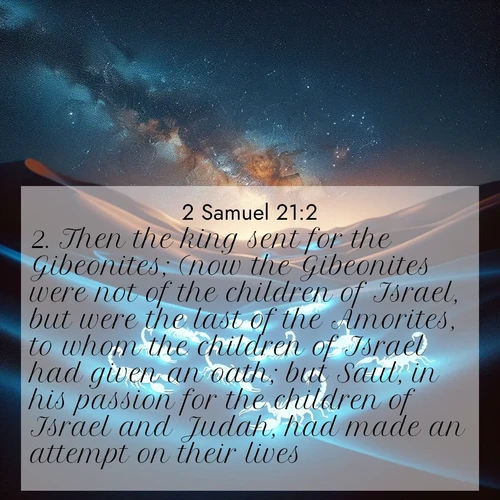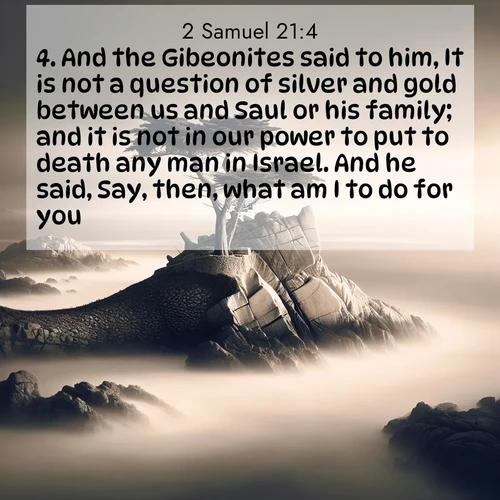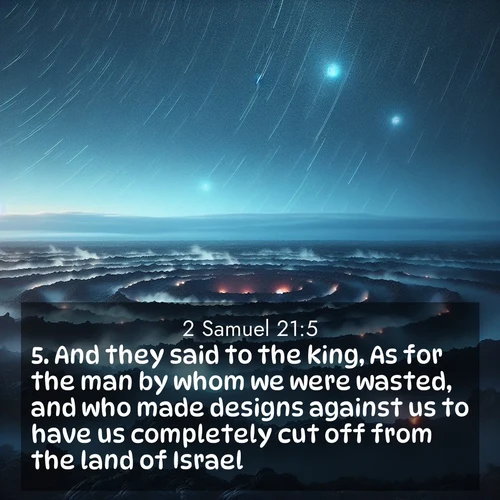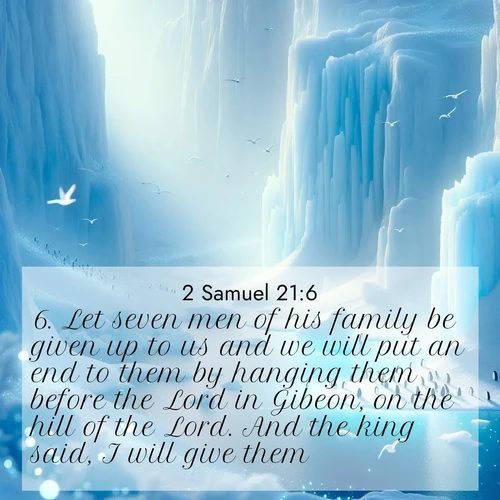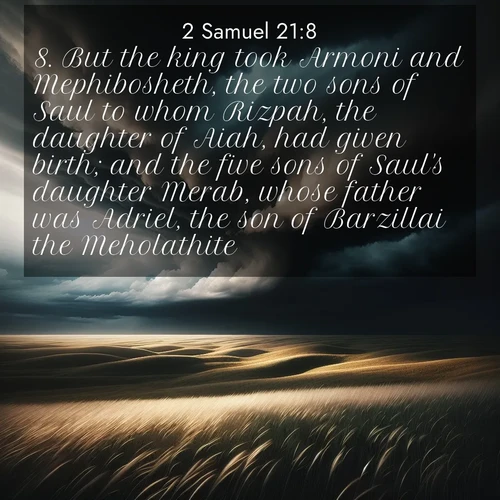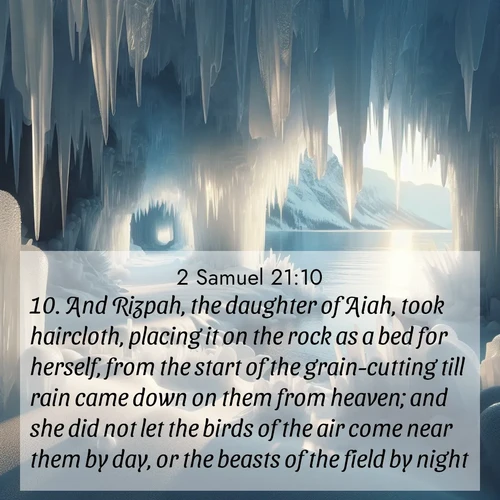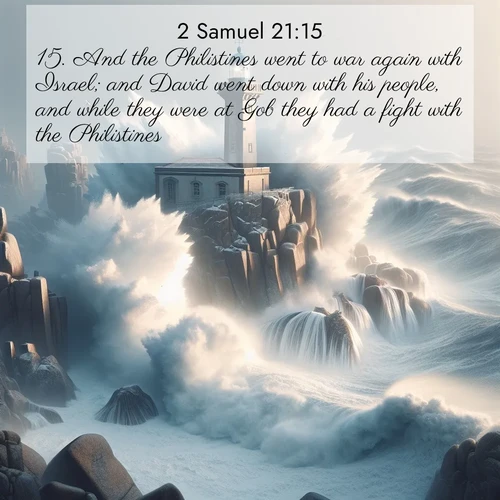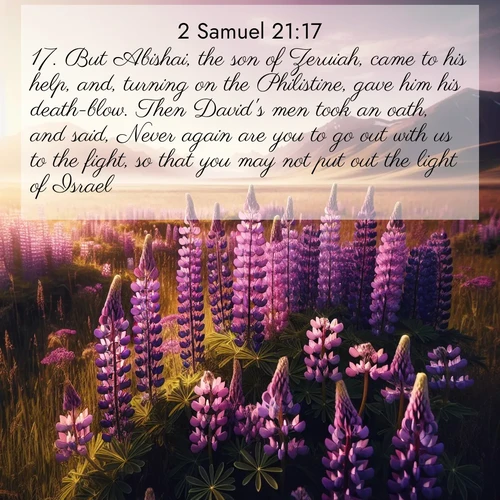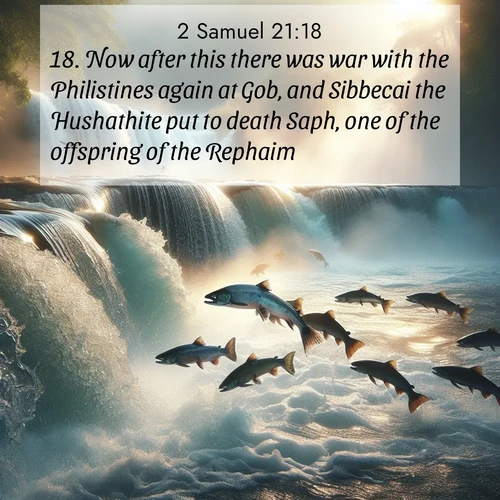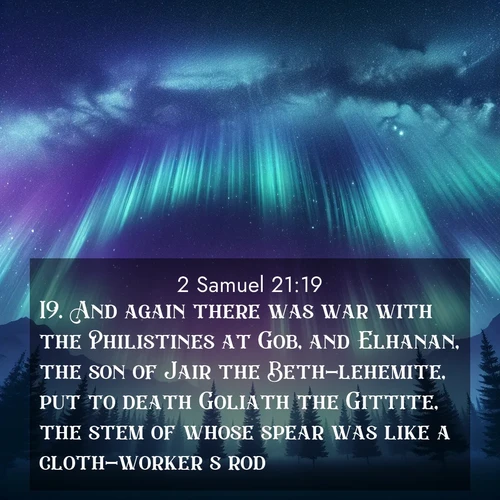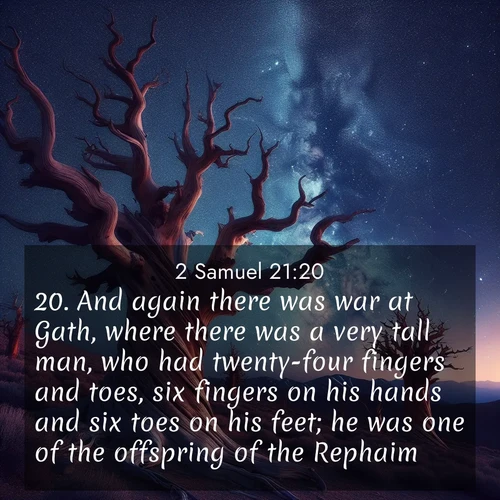Biblical Themes Visualized: Basic English Bible Images for 2 Samuel Chapter 21
2 Samuel 21:1. In the days of David they were short of food for three years, year after year; and David went before the Lord for directions. And the Lord said, On Saul and on his family there is blood, because he put the Gibeonites to death.
Read the verse in its context:
Basic English 2 Samuel 21
2 Samuel 21:2. Then the king sent for the Gibeonites; (now the Gibeonites were not of the children of Israel, but were the last of the Amorites, to whom the children of Israel had given an oath; but Saul, in his passion for the children of Israel and Judah, had made an attempt on their lives:)
Read the verse in its context:
Basic English 2 Samuel 21
2 Samuel 21:3. So David said to the Gibeonites, What may I do for you? how am I to make up to you for your wrongs, so that you may give a blessing to the heritage of the Lord?
Read the verse in its context:
Basic English 2 Samuel 21
2 Samuel 21:4. And the Gibeonites said to him, It is not a question of silver and gold between us and Saul or his family; and it is not in our power to put to death any man in Israel. And he said, Say, then, what am I to do for you?
Read the verse in its context:
Basic English 2 Samuel 21
2 Samuel 21:5. And they said to the king, As for the man by whom we were wasted, and who made designs against us to have us completely cut off from the land of Israel,
Read the verse in its context:
Basic English 2 Samuel 21
2 Samuel 21:6. Let seven men of his family be given up to us and we will put an end to them by hanging them before the Lord in Gibeon, on the hill of the Lord. And the king said, I will give them.
Read the verse in its context:
Basic English 2 Samuel 21
2 Samuel 21:7. But the king did not give up Mephibosheth, the son of Saul's son Jonathan, because of the Lord's oath made between David and Jonathan, the son of Saul.
Read the verse in its context:
Basic English 2 Samuel 21
2 Samuel 21:8. But the king took Armoni and Mephibosheth, the two sons of Saul to whom Rizpah, the daughter of Aiah, had given birth; and the five sons of Saul's daughter Merab, whose father was Adriel, the son of Barzillai the Meholathite:
Read the verse in its context:
Basic English 2 Samuel 21
2 Samuel 21:9. And he gave them up to the Gibeonites, and they put them to death, hanging them on the mountain before the Lord; all seven came to their end together in the first days of the grain-cutting, at the start of the cutting of the barley.
Read the verse in its context:
Basic English 2 Samuel 21
2 Samuel 21:10. And Rizpah, the daughter of Aiah, took haircloth, placing it on the rock as a bed for herself, from the start of the grain-cutting till rain came down on them from heaven; and she did not let the birds of the air come near them by day, or the beasts of the field by night.
Read the verse in its context:
Basic English 2 Samuel 21
2 Samuel 21:11. And news was given to David of what Rizpah, the daughter of Aiah, one of Saul's wives, had done.
Read the verse in its context:
Basic English 2 Samuel 21
2 Samuel 21:12. And David went and took the bones of Saul and his son Jonathan from the men of Jabesh-gilead, who had taken them away secretly from the public place of Beth-shan, where the Philistines had put them, hanging up the bodies there on the day when they put Saul to death in Gilboa:
Read the verse in its context:
Basic English 2 Samuel 21
2 Samuel 21:13. And he took the bones of Saul and his son Jonathan from that place; and they got together the bones of those who had been put to death by hanging.
Read the verse in its context:
Basic English 2 Samuel 21
2 Samuel 21:14. And they put them with the bones of Saul and his son Jonathan in the resting-place of Kish, his father, in Zela in the country of Benjamin; they did all the king had given them orders to do. And after that, God gave ear to their prayers for the land.
Read the verse in its context:
Basic English 2 Samuel 21
2 Samuel 21:15. And the Philistines went to war again with Israel; and David went down with his people, and while they were at Gob they had a fight with the Philistines:
Read the verse in its context:
Basic English 2 Samuel 21
2 Samuel 21:16. And there came against David one of the offspring of the Rephaim, whose spear was three hundred shekels of brass in weight, and having a new sword, he made an attempt to put David to death.
Read the verse in its context:
Basic English 2 Samuel 21
2 Samuel 21:17. But Abishai, the son of Zeruiah, came to his help, and, turning on the Philistine, gave him his death-blow. Then David's men took an oath, and said, Never again are you to go out with us to the fight, so that you may not put out the light of Israel.
Read the verse in its context:
Basic English 2 Samuel 21
2 Samuel 21:18. Now after this there was war with the Philistines again at Gob, and Sibbecai the Hushathite put to death Saph, one of the offspring of the Rephaim.
Read the verse in its context:
Basic English 2 Samuel 21
2 Samuel 21:19. And again there was war with the Philistines at Gob, and Elhanan, the son of Jair the Beth-lehemite, put to death Goliath the Gittite, the stem of whose spear was like a cloth-worker's rod.
Read the verse in its context:
Basic English 2 Samuel 21
2 Samuel 21:20. And again there was war at Gath, where there was a very tall man, who had twenty-four fingers and toes, six fingers on his hands and six toes on his feet; he was one of the offspring of the Rephaim.
Read the verse in its context:
Basic English 2 Samuel 21
2 Samuel 21:21. And when he was purposing to put shame on Israel, Jonathan, the son of Shimei, David's brother, put him to death.
Read the verse in its context:
Basic English 2 Samuel 21
2 Samuel 21:22. These four were of the offspring of the Rephaim in Gath; and they came to their end by the hands of David and his servants.
Read the verse in its context:
Basic English 2 Samuel 21
The images of Bible verses are created starting from the verses in the Basic English Bible and are made vailable freely for download and use. A link to our website is appreciated to let others know about this free image library. The Bible in Basic English was created in the 1940s by S.H. Hooke, an English language scholar. He wanted to make the Bible accessible to people with limited English, those learning it as a second language, and those with low literacy. To achieve this, he used a simplified vocabulary of just 850 common words, with minimal grammar. This made the text easier to understand, though some argue it loses some of the poetry and nuance of the original. Despite this, it has been praised for its clarity and continues to be used today by many, particularly in education and evangelism. Renens AB church encourages you to continue your Bible study.
NOTE: the images are free to use and share. Please include a link to our site to help others find this resource.


